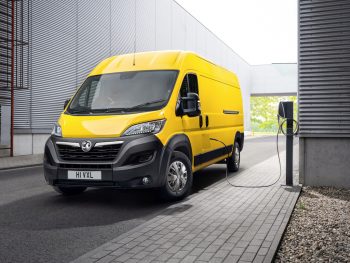New van registrations soared past the 50,000 mark in a bumper March for fleet renewal.

A total of 52,916 new vans, 4x4s and pickups were registered last month, up 11.1% and heralding the best March performance for three years, with volumes now just 7.7% below Q1 2019 pre pandemic.
Demand was up across all LCVs, bar medium-sized vans, according to the new figures from the Society of Motor Manufacturers and Traders (SMMT).
Small vans bounced back with a 44.8% boost to 986 units, while largest models – those weighing more than 2.5 tonnes to 3.5 tonnes – rose 16.1% to represent more than two-thirds (67.3%) of the market.
Demand for medium-sized vans fell slightly by 3.6% to 8,939 units. Pickup volumes increased to 5,767, up 0.1% compared with a particularly strong month last year, while demand for the latest 4x4s rose by 29.1% to 1,632 units.
Uptake of new battery electric vans (BEVs) continued to rise, up 14.7% to 2,906 units, which marked the highest volume on record for a new plate month. This gave a 5.5% market share – up slightly from the 5.3% in March last year but still way short of the 10% target for 2024 under the ZEV mandate.
The SMMT said urgent action was needed to improve the confidence of operators – from large fleets to small businesses and the self-employed – to switch to the growing range of BEV models on offer.
Alongside the retention of existing – and essential – purchase incentives, the industry body has said that a national plan for van-suitable public charge points remains crucial to tackling fleet charging anxiety.
It’s also urged action to tackle the cost of VAT on public charging, which is four times higher than private or home charging and presents another obstacle for businesses planning to transition to a net zero fleet – both issues were also spotlighted to the Transport Minister this week by members of the Zero Emission Van Plan coalition.
Mike Hawes, SMMT chief executive, said: “A strong new plate month with the greatest number of zero emission vans joining UK roads is a bellwether of the sector’s progress, cutting emissions while keeping British businesses on the move. Industry is ready to deliver further, but with green uptake still below mandated levels, swift action is needed to give new van buyers the confidence to go electric. Rapid delivery of van-suitable public charging points and removing the hurdle of taxation on their use are key to greener fleets and a greener future.”
Matthew Davock, director of Manheim Commercial Vehicles, Cox Automotive, commented on the results, saying: “Surpassing 50,000 new LCV registrations in a plate-change month and delivering the best Q1 in three years demonstrates both the health of the LCV sector and strong manufacturer belief here in the UK.
“Strong market penetration by the leading LCV manufacturers is quite evident, as both vehicle build and production delivery highlights. Better overall stock choice is clear to see.
“It’s great to also see strong year-on-year growth areas for smaller volume manufacturers e.g. Maxus, Iveco and Land Rover showing c23% year-on-year growth. Greater choice and availability make for a healthy LCV marketplace.
“Diesel LCVs have retained their market dominance at 91.8%, but battery electric LCVs are up 14.7% year-on-year, representing 5.5% of the total market. That’s a good news story and shows clear intent as many manufacturers continue to bundle deals with diesel to achieve what I feel is a challenging aim, i.e., ensuring 10% of new LCV sales are zero-emission vehicles by the year’s end.”
Sue Robinson, chief executive of the National Franchised Dealers Association (NFDA), had a different take: “Although electric vehicles in the LCV market have seen a slight increase it is somewhat concerning to see these figures hovering around a similar market share to that of the same period last year.
“Following a disappointing Spring Budget, in which price incentives were largely ignored, there still remains concerns amongst van drivers about EV range anxiety, charging infrastructure plus the high price of our-right purchase and the unknown second-hand values, should the vehicle no longer suit their business operations.
“If ZEV targets are to be met it seems imperative that price incentives are put in place as well as addressing concerns about charging by expanding suitable charging infrastructure for vans throughout the UK. Additionally, the fourfold higher VAT cost on public charging compared to private or home charging creates another challenge for businesses aiming to shift to a net-zero fleet.”

